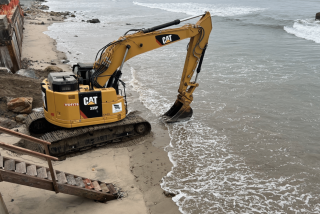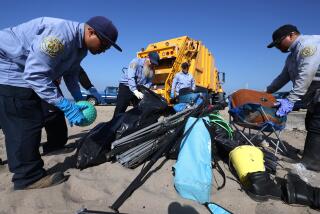Agency Stands Fast on Bolsa Chica OK : Development: Coast panel discounts complaints that Koll firm mishandled human remains, won’t rescind permits.
HUNTINGTON BEACH — The California Coastal Commission has decided not to rescind its permission for the Koll Real Estate Group to build 4,286 homes around the Bolsa Chica wetlands, despite protests by Native Americans that the project could disturb important prehistoric burial grounds.
The decision removes one of a series of governmental hurdles the company must pass before construction can begin.
At the same time, however, a new obstacle has been raised by the Army Corps of Engineers, which recently requested that the company delay demolition of a World War II bunker at the site pending determination of the structure’s historical significance.
“It’s sort of good news, sad news,” said Lucy Dunn, the company’s senior vice president, adding that Koll will postpone demolition of the bunker--originally planned for this week--at least several days to facilitate talks with the Corps of Engineers.
The Coastal Commission’s action came in written response to a request by the city of Huntington Beach that permits issued to the company for the project be reviewed in light of allegations that human remains found at the site may have been mishandled.
After receiving complaints from Native Americans and others regarding the treatment of prehistoric bone fragments found at the site, the city two months ago requested a formal investigation into the matter by the Orange County Grand Jury.
In the Coastal Commission’s response, however, its staff said it had uncovered no evidence of wrongdoing by the company or its representatives.
“In summary,” the staff reported in a memo dated April 13, the Koll company “is in compliance with the requirements of (its) permits, and there is no merit as to the grounds for processing a revocation request.”
In a second memo, the commission’s south coast district director, Charles Damm, also declined to reverse an earlier decision regarding the historical significance of two World War II bunkers originally located at the site. During the permitting process, he wrote, the commission had determined “that the bunkers are not of sufficient historic value to preserve. . . .”
That view is not necessarily shared by the Corps of Engineers, however, which requested in a letter to the Koll company dated April 13 that it “abandon . . . plans to resume demolition of the bunkers on site until their national register eligibility is determined through consultation” with the state Office of Historic Preservation.
Built by the Corps of Engineers in 1944, the bunkers were part of an elaborate defense system planned to protect the California coast from Japanese attack during World War II.
Designed to hold large gun emplacements at either end, they contained huge storage areas for live ammunition as well as latrines and sleeping quarters for their intended crews. Before the structures could be armed and manned, however, the war ended and the bunkers were abandoned.
Koll company bulldozers demolished the smaller of the two bunkers last year after obtaining the Coastal Commission’s permission. Work on the larger one, however, was interrupted in November because of the rainy season.
According to Bruce Henderson, project manager for Bolsa Chica, the Corps of Engineers intends to make a determination within a few weeks to a few months regarding the historical significance of the remaining bunker.
“Our people are willing to resolve this matter in the very short term, and I think we will do so,” he said.
Any determination of historical significance, he said, would eventually have to be confirmed by the Office of Historic Preservation.
But even such a determination would offer no guarantees regarding the future of the remaining structure, according to Gary Reindehl, an associate state archeologist with the Office of Historic Preservation.
“It does not ensure any kind of protection,” he said. “Typically, it does not preclude a project from going forward.”
More to Read
Sign up for Essential California
The most important California stories and recommendations in your inbox every morning.
You may occasionally receive promotional content from the Los Angeles Times.









